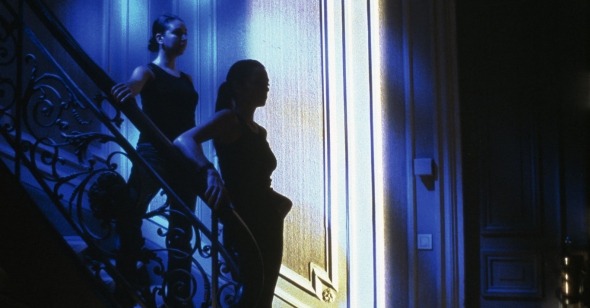Pleasure Island
By Nick Pinkerton
Exterminating Angels
Dir. Jean-Claude Brisseau, France, IFC
“One step above the sublime makes the ridiculous, and one step above the ridiculous makes the sublime again.”
—Thomas Paine
The abovementioned describes the spectrum over which Jean-Claude Brisseau’s filmmaking hopscotches, and it’s the tension in that risk-taking that makes him essential—even (especially?) when he produces a frustration like “Exterminating Angels.” François (Frédéric van den Driessche), a middle-aged filmmaker, burrows into a vaguely defined new project that aims to excavate mysteries of intimacy: generally, the feminine sexual imagination; specifically, the female orgasm. Such a film being necessarily a collaboration, he begins an unusually rigorous audition process: actresses masturbate in front of him and, inhibition uncorked, encouraged by their director’s stoical receptivity, reveal intimate details of their sexual history.
Aside from Driessche, men appear in Exterminating Angels only peripherally, but the film is stocked with a panoply of women, corporeal—the auditions narrow to three twentysomethings, Charlotte (Maroussia Dubreuil), Julie (Lise Bellynck), and Stéphanie (Marie Allan)—and otherwise: overseeing François’s undoing, invisible to him, are a pair of angels (Raphaële Godin and Margaret Zenou), clad in black getups that make them resemble cosmic stagehands. François has a steady, age-appropriate partner to come home to, but he’s drawn ever closer to the tempestuous sexuality of his actresses, orchestrating their erotic explorations in public places and rented rooms, intent and worshipful.
Suffusing the film are the facts of Brisseau’s own life: after the casting of his 2002 baroque-noir Secret Things (his only film currently available on Region 1 DVD), during which he required the sexual complicity of his would-be starlets, four hopeful actresses, none of whom appeared in the final film, accused the director of harassment. He was charged, fined, let off with a suspended sentence.
Brisseau’s a heap-like man, nobody’s idea of a lady-killer—that’s him, briefly onscreen, helping to subdue an on-set tantrum—but though his dashing alter-ego in Exterminating Angels enjoys attention from a buffet of young, tantalizing women, I never got the queasy feeling that comes from, say, watching Woody Allen surround himself with willing lovelies. That’s thanks to this director’s unsparing curiosity in defining the dynamic between this established older man with a modicum of authority and these women, variously wracked by the tidal emotions of youth (his extraordinary “Noce Blache,” about a schoolteacher’s affair with a suicidal student, explores similar territory). Questions of ethics are broached, of the potential for abuse inherent in the position of mentor/ director, of the line between empathy and pederasty, of the perilous fragility of these girls willing to spread their legs on the alter of Art (or Fame? or just Recognition?). Is Exterminating Angels an apologia? A mea culpa? Are the confessions we hear, some of them seemingly from the pages of a Penthouse Forum, getting at some sort of truth—or are they the eager-to-please buncombe of unimaginative auditioners? Whatever the case, the film is a poetic, provocative response to an era of facile psychology that encourages the packaging of every sexual fear and insecurity into convenient traumas to be “overcome” (with litigation, when necessary).
In Brisseau’s hands, sex is dangerous and wonderfully incomprehensible. François expresses confidence that his work will explore “almost virgin territory,” which seems unsupportable on the surface, film culture having systematically violated its taboos for decades, but Brisseau/ François are questing after that Holy Grail of pornography, conjuring the internality of feminine pleasure into visibility. The religious language isn’t accidental; Brisseau is an artist attuned to the spiritual, looking for transcendence in orgasm, that place where the “grace of the pleasure on their faces” intersects with the gratitude and surrender of Bernini’s St. Theresa (the syllogism isn’t a fresh one, but this doesn’t damper the beauty). The autocritique ends in a practical admission of failure, of “chasing the wind,” as the further François pushes, the further that last frontier retreats… But it should be noted that Brisseau’s failures outdo many a masterpiece.
